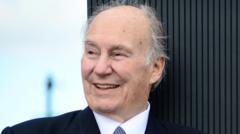The Yukon territory has revised its oath requirement for municipal officials after Dawson City councillors hesitated to pledge allegiance to the Crown, citing historic injustices against indigenous peoples. The new legislation permits an alternative oath aligned with contemporary values.
Dawson City Council's Oath Controversy Sparks Legislative Change in Yukon

Dawson City Council's Oath Controversy Sparks Legislative Change in Yukon
Elected officials in Dawson City now have the option to pledge allegiance to Canada’s constitution following a refusal to take the King’s oath in solidarity with indigenous concerns.
Dawson City, a small town in Yukon, Canada, has made headlines following a significant change in its oath of allegiance requirements for elected officials. This shift comes after the newly-elected council members, in a powerful act of solidarity with an indigenous councillor, refused to take the King's oath due to concerns over the British Crown’s historical impact on indigenous communities in Canada.
On Friday, Yukon officials announced that they would now allow municipal leaders to pledge allegiance to the Canadian constitution instead of to King Charles III. This decision aims to reflect modern societal values and address the ongoing discourse surrounding colonial legacies. Richard Mostyn, Yukon's minister for community services, emphasized the importance of this legislative change in supporting diverse cultural identities.
Under existing Yukon regulations, newly-elected officials were bound to swear an oath within 40 days of their election, leading to potential governance challenges for Dawson City, which faced a standstill as council members awaited a resolution. Councillor Darwyn Lynn, a member of the Tr’ondëk Hwëch’in First Nation, articulated his struggle with the King's oath, highlighting the need for alternatives amidst Canada’s complex history.
The rejection of the traditional oath sparked meaningful discussions about the relationship between the Crown and indigenous peoples, promoting an openly balanced dialogue within Dawson City, a community of approximately 2,400 residents. Lynn noted the importance of accommodating differing opinions within this conversation, reinforcing the values of democracy and respect.
The new law allows council members the flexibility to choose oaths that resonate personally, a significant step forward in recognizing the diverse voices in Canadian society. This follows similar legislative moves in other parts of Canada; in 2022, Quebec eliminated the requirement for its elected officials to swear allegiance to the monarchy, marking a shift towards progressive governance.
While the Dawson City council prepares to take the newly available oath options, debates surrounding mandatory oaths to the monarch continue at the national and provincial levels, prompting questions about the future of traditional allegiance in a modern, multicultural Canada.





















